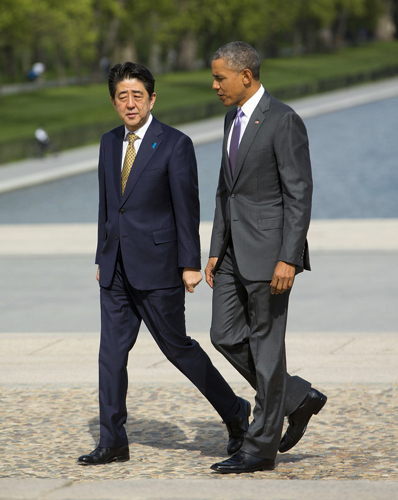U.S., Japan announces new defense cooperation guidelines
By KH디지털2Published : April 28, 2015 - 09:27
The United States and Japan on Monday announced a new defense cooperation pact designed to significantly expand Japan's military role in the region and beyond amid concern it could be a first step toward a revival of Japanese militarism.
The new Guidelines for U.S.-Japan Defense Cooperation also attempted to address South Korea's concern about Japan exercising "collective self-defense" around the Korean Peninsula without Seoul's consent, saying the two countries will act "in accordance with international law, including full respect for sovereignty."
"When the United States and Japan each decides to take actions involving the use of force in accordance with international law, including full respect for sovereignty, ... to respond to an armed attack against the United States or a third country ... they will cooperate closely to respond to the armed attack and to deter further attacks," it said.

Japan's "Self-Defense Forces will conduct appropriate operations involving the use of force to respond to situations where an armed attack against a foreign country that is in a close relationship with Japan occurs and as a result, threatens Japan's survival and poses a clear danger," the new guidelines said.
Collective self-defense empowers Japan to fight alongside its allies even when not under attack itself. In July last year, Japan's Cabinet reinterpreted Tokyo's war-renouncing constitution to make it possible for the country to exercise the right.
Critics denounced the decision as a precursor to Japan ultimately amending the country's pacifist constitution. Seoul and Beijing viewed the move warily as it calls to mind Japan's past militarism amid concerns that the power could be misused.
Monday's agreement was announced after the U.S. and Japan held a meeting of their defense and foreign ministers in New York. Attending the so-called "two plus two" meeting were Secretary of State John Kerry, Secretary of Defense Ashton Carter, Japanese Foreign Minister Fumio Kishida, and Defense Minister Gen Nakatani.
The meeting took place as Japanese Prime Minister Shinzo Abe began a high-profile visit to the U.S.
The United States and Japan have negotiated to revise the 1997 guidelines to reflect changes in regional and global security situations and to have Japan take on greater military roles in a move seen as aimed in part at countering China's rise.
The pact has also been a focus of attention in South Korea amid concern about the possibility of Japan sending forces to the Korean Peninsula in the name of aiding the U.S. in the event of contingencies such as a conflict with North Korea.
Japanese boots on the peninsula are one of the last things South Koreans want to see due to painful memories of Japan's colonial rule of Korea from 1910 to 1945. Concerns about Japan seeking greater military power have worsened as Abe has taken a series of nationalist steps.
South Korea has demanded Japan win explicit consent from Seoul if it wants to exercise collective self-defense in contingencies on the peninsula. It also urged Tokyo to dispel doubts and concerns stemming from history and work harder to win confidence from its neighboring countries.
A senior U.S. defense official dismissed Seoul's concerns.
"I want to stress that what we do under the new guidelines will be thoroughly consistent with the Japanese constitution. What we do will be thoroughly consistent with international law. And of course, we will be giving full respect to the sovereignty of third countries in the region," the official said at a background briefing.
The official also said that the new guidelines would actually be conducive to South Korea's security, saying the "threat from North Korea is increasing."
"We believe U.S.-Japan cooperation under the guidelines will contribute to not only security and stability in the region generally, but to security and stability on the Korean Peninsula. Our forces in Japan are very important in any major Korean contingencies because we will be flowing forces through Japan to the Korean Peninsula," the official said.
"So any improvement in our ability to cooperate with the Japanese, any improvement in Japan's ability to support our efforts in a regional contingency like in the ROK will improve and strengthen security on the peninsula," he said.
The revised guidelines centered on eliminating geographical restrictions on U.S.-Japan military cooperation that had previously been limited to areas around Japan. That means Japan now can send forces to help with U.S. operations in any part of the world.
"The alliance will respond to situations that will have an important influence on Japan's peace and security. Such situations cannot be defined geographically," the guidelines said.
Under the new guidelines, Japan will be able to intercept ballistic missiles headed to the United States, defend U.S. ships engaged in missile defense activities, and provide logistical support to U.S. forces when they are engaged in armed conflict in areas beyond the region.
The agreement also calls for greater cooperation in new areas, such as cyber and space. (Yonhap)








![[Graphic News] More Koreans say they plan long-distance trips this year](http://res.heraldm.com/phpwas/restmb_idxmake.php?idx=644&simg=/content/image/2024/04/17/20240417050828_0.gif&u=)
![[KH Explains] Hyundai's full hybrid edge to pay off amid slow transition to pure EVs](http://res.heraldm.com/phpwas/restmb_idxmake.php?idx=644&simg=/content/image/2024/04/18/20240418050645_0.jpg&u=20240419100350)





![[From the Scene] Monks, Buddhists hail return of remains of Buddhas](http://res.heraldm.com/phpwas/restmb_idxmake.php?idx=652&simg=/content/image/2024/04/19/20240419050617_0.jpg&u=20240419175937)

![[KH Explains] Hyundai's full hybrid edge to pay off amid slow transition to pure EVs](http://res.heraldm.com/phpwas/restmb_idxmake.php?idx=652&simg=/content/image/2024/04/18/20240418050645_0.jpg&u=20240419100350)

![[Today’s K-pop] Illit drops debut single remix](http://res.heraldm.com/phpwas/restmb_idxmake.php?idx=642&simg=/content/image/2024/04/19/20240419050612_0.jpg&u=)